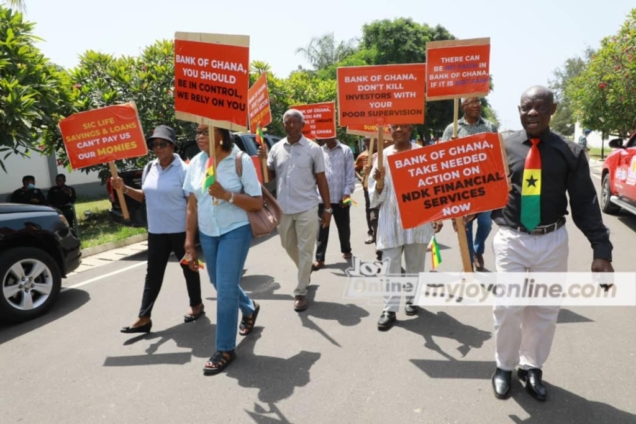Eight years after Ghana launched a massive financial sector clean-up, the promised stability has turned into a prolonged nightmare for thousands of c
Eight years after Ghana launched a massive financial sector clean-up, the promised stability has turned into a prolonged nightmare for thousands of citizens whose savings remain inaccessible. Over 400 financial institutions collapsed during the 2017 exercise, leaving depositors, investors, and retirees grappling with financial ruin and emotional distress.
Speaking on the JoyFM Super Morning Show on Monday, November 10, victims shared heartbreaking stories of lives derailed, businesses crippled, and children denied education. For many, the loss of life savings has become a public health crisis, with depression, hopelessness, and stress-related illnesses taking a deadly toll.
“I’m 69 years old, a pensioner, and the worst financial decision I made was investing my hard-earned money. I have about GH₵400,000 locked up with an investment firm whose license has not been revoked. Sadly, some of my colleagues have passed on,” one listener recounted.
Another added: “I worked nine years at a rural bank, and our third-tier funds were invested with an SDI. After the clean-up, the government converted the funds into a zero-coupon bond. As it stands, over GH₵18–20,000 of my nine years’ work is still locked up.”
The crisis has also caused inter-generational hardship. Yaw, a middle-aged businessman, explained that losing the working capital for his construction firm forced him to withdraw his two children from a private secondary school, underscoring the ripple effect of the financial collapse.
Billions Still Locked
The clean-up began in 2017 with the Bank of Ghana targeting nine commercial banks, 23 savings and loans companies, and 347 microfinance institutions. The Securities and Exchange Commission followed by revoking the licences of 53 investment companies. The total fiscal cost of the exercise was estimated at over GH₵21.6 billion, primarily used to compensate some depositors and issue government bonds.
Despite partial disbursements, many depositors, particularly those tied to microfinance, savings & loans institutions, and fund management companies, still await access to their locked funds. The prolonged delay continues to suffocate small businesses and erode public trust in financial institutions.
Victims are calling on the Ministry of Finance and the Bank of Ghana to expedite final payments and ensure accountability by prosecuting those responsible for the collapse. Some have even appealed directly to President John Dramani Mahama for intervention.
Many depositors argue that certain firms could have been salvaged to prevent massive job losses and reduce the social and economic fallout, citing Groupe Nduom and its financial subsidiaries as a notable example.
Nearly a decade later, hope remains that the government will deliver justice and closure for victims of the 2017 financial clean-up, bringing an end to one of the most prolonged financial crises in Ghana’s recent history.
